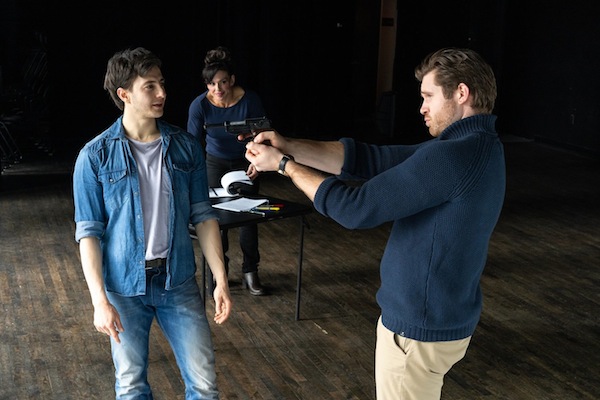Michael Germant, left, Sarah Boes and Drew Henderson co-star in Island Production’s The Understudy, Aug. 1-10 at PAL Studio Theatre. (photo by Jayme Cowley)
Oftentimes, in cultural endeavours, there is a tension between artistic vision and profit margins; that is, if there is any money to be made. This is one of the themes of The Understudy by Theresa Rebeck, which is being presented by Island Productions next month at PAL Studio Theatre.
The show co-stars Sarah Boes as Roxanne, the stage manager, who also is a frustrated actor; Drew Henderson as Jake, the good-looking action-hero star trying to be taken seriously as an actor; and Jewish community member Michael Germant as Harry, the understudy, who happens to be Roxanne’s ex-fiancé. Despite the personal drama, “a stoned lightboard operator, an omnipresent intercom system [and] the producers threatening to shutter the show,” Roxanne must try to run the understudy rehearsal for the Broadway première of a recently discovered Franz Kafka masterpiece.
Existentialism, explains director Mel Tuck in his online notes for the production, “denotes the inexplicable nature of human existence and emphasizes man’s freedom of choice and responsibility for the consequences of his acts.”
“What I like about The Understudy and what I think is funny,” Germant told the Independent, “is that, just when you think the characters have got things under control, everything falls apart. I also love how Rebeck makes the events of the play intertwine with the events of Kafka’s ‘undiscovered’ play-within-the-play thematically.”
Echoing Tuck’s comments, Germant added, “The existential aspects in Kafka’s play lead to the final choice that our three protagonists make at the end, both within and ‘without’ Kafka’s play.”
About those protagonists and what they symbolize, Tuck writes, “There are actors that have substantial careers because they are attractive, and then there are actors who have chameleon-like skill at hiding themselves within the role they are playing. Both have their place and purpose. The battle between art and business is forever being played out before our very eyes. There are many arguments for art as opposed to business. We artists believe in the value of entertainment and intelligent growth for ourselves and our public. We are exploring polarities and the implications of internal versus external thoughts; how we are affected by our conditioning and how that manifests in our social lives and activities. In the theatre, as in movies and TV, one prime issue has taken precedence: money. Money is a defining and deciding factor in avenues of artistic endeavour. What is the best possible way to make a play, movie or TV show successful? The sad reality is usually money takes precedence. And often funny means money. This is a very funny play.”
The Independent has interviewed Germant a few times, all for serious dramas, but he has done comedy before.
“Good dramas have humour written into them,” he said. “It’s the spoonful of comedy that makes the drama go down. And vice versa – good comedies like The Understudy have drama at their core.
“We’ve actually done another comedy, called Seminar, by Theresa Rebeck…. A drama we did – John Patrick Shanley’s The Dreamer Examines his Pillow – has a lot of humour, and a comedic ending. Both of those plays were also at the PAL Studio Theatre and both in 2014,” said the actor, for whom this play marks his seventh for Island Productions.
“On screen,” he added, “I was in a pilot called High Moon, where my character was the comic relief, and I did a short dark comedy, which was really well-received at film festivals this year called Caught in the Spokes.”
About the ways in which comedic and dramatic roles differ, Germant said, “Comedy is heightened pace and energy. In drama, you can set your own pace – you can pause or take a break or a breath wherever you want. But comedy is structured very specifically and timing is the golden rule. In that way, it’s more disciplined and difficult than drama.”
For tickets to The Understudy, which runs Thursday through Saturday, 8 p.m., Aug. 1-10, visit understudy.brownpapertickets.com.


